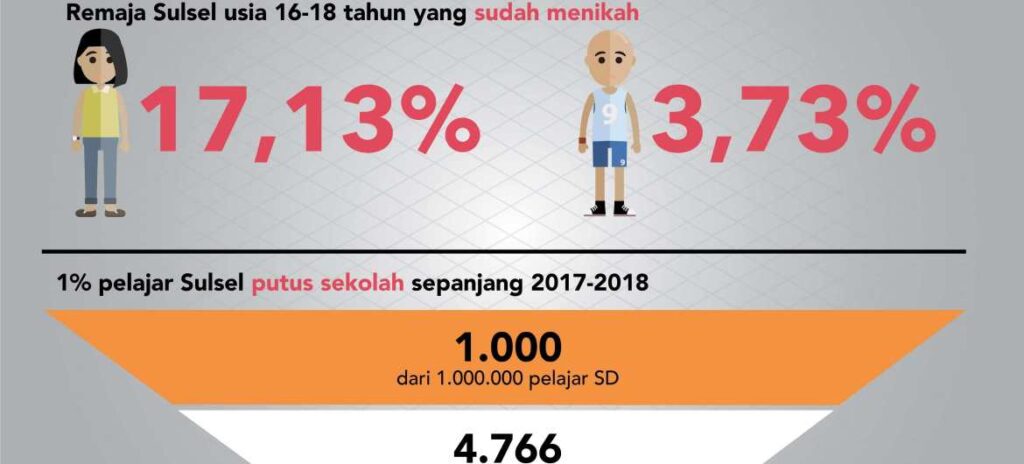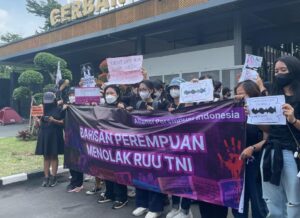
The story of Asrianti, then Putri Intan, is just one example of the many stories of the fate of children who leave school to get married. There are many cases of children in Kodingareng who were forced to quit school after graduating from primary school because their families wished them to marry. The worst cases date back to 2009 and earlier, before secondary high school education was available in that area and children were forced to travel off the island to continue their schooling. At that time, when girls received an offer of marriage, their parents preferred them to get married rather than continue their education and face severely difficult access issues to reach their schools.
While access to education at the State Secondary High School 38 in 2009 brought new life to the island, the attendance rate at Senior High School Citra Bangsa Kodingareng in 2010 still could not eliminate child marriage cases in Kodingareng because of education fees charged by the foundation which owns the school.
School dropout cases have ordinarily happened at each level, especially in secondary high school and senior high school. Based on the data sourced from the South Sulawesi Education Office, the number of school dropout cases in the 2017-2018 school year at the senior high school level was 4,133 students out of a total of 351,000. The term senior high school includes senior high school, SMK, SLB, and Islamic senior high school.
In addition to the data for senior high schools, considering secondary high school for the 2017-2018 school year (junior high school and Islamic elementary school), 4,766 students dropped out of a total of 473,000. Meanwhile, considering the data for the 2017-2018 school year for primary school, 10,000 students dropped out of a total of 1,000,000. Out of 24 regencies/cities, the highest percentage of school dropouts occurred in Palopo city (1,500 dropouts out of a total of 6,000 students), with the lowest in Makassar (385 dropouts out of a total of 71,000 students).
Child marriages take place in the central part of Makassar city as well as on the island. DL, a resident of Manggala subdistrict, is an example of this. DL was awaiting the birth of her child, a son (according to her obstetrician and based on the results of ultrasonography [USG]). At the time of interview at the end of last January, DL’s pregnancy was close to the delivery period; the 16-year-old girl was experiencing a mixture of emotions; happiness and disappointment at one and the same time.
DL’s baby would be born without a visible father. DL chose to return to her family and left AB, her husband whom she had married in early 2018, because she could not tolerate living with a man who did not provide her with physical and mental support. DL considers AB to be an irresponsible husband. The income from his work as a construction labourer was not used to support DL or allocated for childbirth, but for playing playstation games in the internet café. While AB is close in age to DL, (he was 19 years old at the time of their marriage), psychologically he is not sufficiently mature to bear the burdens of supporting a family.
DL said she will never reunite with AB, even though he has asked her to return home and stay with the family. “My marriage was a mistake, it was too early. I have just realised what has happened to me,” DL said. She chose not to continue her studies to senior high school after graduating from secondary high school following her marriage.
DL is now living with her aunt, the elder sibling of her father who took care of her and raised her from childhood after she was abandoned by her divorced parents. DL’s aunt, Humairah (not her real name) was concerned about DL’s condition, since while still a teenager she already has to bear the heavy burdens of life.
Humairah’s prospective grandchild has to be raised alone by a girl who is psychologically and economically very vulnerable. She never thought that the marriage, which was unregistered, would have ended with unhappiness and with irresponsible behaviour. DL’s education level is inadequate to permit her to apply for a job as a means of supporting herself and her child.
Threatening Children’s Rights
Data from the foundation Rumah KitaB (Rumah Kita Bersama), a research agency with the policy to strive for the rights of marginalised groups such as women, indicates that 25 percent of children marrying before the age of 18 years old decide to divorce within one year. Additionally, only one of 10 child marriage victims returns to school. What DL experienced represents the general circumstances of victims of child marriage.
The hard life experienced by DL after being given for marriage by the family, said Mulyani Hasan, steering member of Rumah KitaB in Makassar, has violated Law no. 10/2012 on Optional Protocol to the Convention on the Rights of the Child such as Child Trafficking, Child Prostitution and Child Pornography. This law explains that a child has the right to be protected from economic and labour exploitation which endangers or affects child education, damages physical health, mental, spiritual, moral and social development of children.
A child is defined in Law no. 23/2002 on Child Protection as a person under the age of 18 years. Although the law states the importance of protection and fulfilment of children’s rights, Mulyani explained that no law prohibits child marriage which is clearly harmful to the interests of the child.
The research conducted by Rumah KitaB found that 97 percent of dispensation petitions to the Religious Court for early marriages are granted by the judges.
According to data from the Makassar Religious Court Class 1A, 59 marriage dispensations were granted out of 80 cases in 2018. Unexpected pregnancy is one of the dominant causes of issuance of such dispensations. The remaining petitions were dismissed and disqualified.
Said Shafar Arfah, Junior Registrar of Makassar District Court, early last February at his office on Jalan Perintis Kemerdakaan: “Petitions are usually rejected because the petitioner was unable to prove that the female partner of the couple to be married was pregnant, or because the children did not want to marry but were being forced to do so by their parents; we reject this kind of petition.”
In addition to the rejected petitions for dispensation, Shafar continued that many petitioners are disqualified or do not continue with the case. “For example, after they apply, the waiting process will take weeks, and if the invitation cards have already been distributed, they usually decide not to continue the case,” he said.
Fatherless Children
The child born to Asrianti, and also the baby in the pregnancy of DL, are just two of the children born of unregistered marriages. Absence of formal documents from the government evidencing the marriage of their parents is a judicial constraint in fulfilling the child’s identity right, namely his/her birth certificate.
Civil Administration Law no 23/2006 on Civil Administration of Birth Certificates requires submission of formal documentation such as a marriage certificate, resident identity card (KTP), and family registration card (KK) for issuance of a birth certificate, limiting the reporting period and retribution which hinders childbirth registration.
Aryanti Puspasari Abady, Head of the Office of Population and Civil Registration, Makassar city, explained that the birth certificate is the fundamental right of every child given after his/her birth. Every child born must be given identity as an Indonesian Citizen as set out in Law no. 35/2014 as amendment to Law no. 23/2002 on Child Protection.
Article 27, paragraphs (1) and (2) states that “the personal identity of a child must be given from his/her birth. The child’s identity in paragraph (1) is set out in the birth certificate.” The birth certificate, issued by the Office of Population and Civil Registration, is authentic evidence of the status and birth of a person.
“Parents must fulfil the children’s rights of the birth certificate as it is a form of state recognition and legal evidence of a person’s existence,” Aryanti remarked at her office on Jalan Sultan Alauddin on Tuesday (19/2/2019).
In Makassar there are unregistered or legally unregistered births. As a consequence, the wellbeing and survival of a child in the future may also be affected, for example in relation to access to education and health services. One of the factors causing low ownership of birth certificates is non-compliance with the requirements in the process of issuing a birth certificate.
Aryanti said that a child born from a married couple without a marriage certificate may be acknowledged by the state by a birth certificate. However, a marriage not recorded by the marriage registrar is an illegal marriage according to Indonesian law, even though it is permitted in religion. Therefore a child born to a married couple without a marriage book has a legal relationship with the mother only.
“So, the birth is registered, but the birth certificate names only the mother, not the father,” Aryanti summarised. The requirements for birth certificate applications are the same as for other children in general, but must include a statement letter of no marriage bond by the mother of the child. As for children whose parents are legally married but without a marriage book, application for certification may be made to the Office of Religious Affairs.
If the requirements are not complied with, the parents of the child may verify their marriage in the Religious Court.
Marriage verification is a petition to verify the marriage submitted to the court for a marriage to have legal effect. If the petition for marriage verification is granted, the rights of the husband/wife and children from the marriage will be assured, including ownership of birth certificates for the children born of the marriage.
In 2018, the Office of Population and Civil Registration of Makassar city issued 311 birth certificates without the father’s name, 180 for boys and 131 for girls. The highest number of children lacking a statement of the father’s name was in Tamalate subdistrict (59 children, 32 boys and 27 girls). Next was Panakkukang subdistrict (39 children, 20 boys and 27 girls), followed by Rappocini subdistrict (37 children, 21 boys and 16 girls).
This number represented an increase of birth certificates issued without the father’s name over the previous year (2017) for which the total was only 141 children (64 boys and 77 girls). Tamalate still ranked the first with a total of 23 children (7 boys and 16 girls), followed by Rappocini (total 16 children, 7 boys, and 9 girls), and Panakkukang (total 15 children, 6 boys and 9 girls).
Fadiah, Director of Child Protection Agency of South Sulawesi, explained that the worst impact of child marriage is the difficulty to fulfil the identity right of the father in state civil documents. The child will be the next victim of the underage marriage, and will suffer psychological effects as a result.
A possible solution for the parents is to have the marriage affidavit registered with the Office of Religious Affairs. “Still, it remains a dillema. It seems to give way when the parents apply for the marriage certificate,” Fadiah explained.
According to Fadiah, there will be negative perception from the community of a child without a named father. The community will consider the child to have been born without a known father. Personally, Fadiah greatly hopes that the government as the policy maker will permit a child born from an illegal marriage to still have the name of his/her father on the birth certificate.
It is recognised that establishing such a policy is not an easy matter. This will need hard work and promotion by the coalition of children’s and women’s protection in South Sulawesi. A birth certificate, Fadiah said, is something non- bargainable. “A birth certificate is a child’s right, even UNICEF has mentioned children’s rights as a matter of utmost importance,” Fadiah concluded.
Who will act?
Activists for women’s and children’s protection in Makassar agree that child marriage can only be prevented if the stakeholders open their eyes and are willing to intervene to protect children, especially girls, from violation against human rights.
Eliminating poverty is a vital necessity, and will ease the economic burden of parents considering marrying off their children. Creating broader opportunities for children to continue their studies at school, and allowing room for re-discussion of the tradition or cultural practices leading to the preservation of the custom of child marriages are also essential.
Director of the Institute of Community Justice, Sunem Fery Mambaya, mentioned that the points above represent efforts to be taken to suppress the practice of child marriages. Work towards child marriage prevention can only be effective if promoted jointly by multi-stakeholders. “It can be dealt with by parents, community, and government, with all parties involved in discussions. The government as policy maker must resolve this issue by adopting regulations,” said Fery, at his office last February.
In the aspects of health, education, law, religion and others, child marriage must be taken into account, with dissemination of information on child marriage prevention, health hazards and various issues and legal risks related to child marriage. “Sometimes, we do not realise that, as parents, we have behaved unfairly towards children, violating their rights. We do not realise that we have engaged in corrupt behaviour in the child marriage issue, and this constitutes a crime,” Fery added.
Steering member of Rumah KitaB in Makassar, Mulyani Hasan, mentioned that gaps for child marriage prevention in the existing regulation can be dealt with by age restriction at the time of marriage.
Local government, the Office of Religious Affairs and Religious Court, in her opinion, are the parties with the greatest capacity to be responsible for the issue. In addition to ensuring no false witness when the Religious Court issues a dispensation, marking up a child’s age must also be prevented. “This will need involvement of the local government, Ministry of Religious Affairs (Kemenang), the Religious Court, religious leaders, community leaders and parents,” Mulyani said.
The Women’s Empowerment and Child Protection Agency (DP3A) of Makassar city has involved local organisations and cross-sector institutions to suppress early or young age marriages. Preventing and handling child marriages should also be addressed by RT/RW through community shelters.
Head of the DP3A office in Makassar, Tenri A Palallo, said the village shelter is a new innovative program to create a comfortable world’s city for women and children. This involves community members and leaders in prevention of and protection of women from violence and child abandonment, including child marriage.
“So the community shelter team is provided with the skills through management training to cope with women’s and children’s issues through the RT/RW, where a persuasive approach must be sought,” Tenri A. Palallo said. He also said that many child marriage agreements were cancelled following advice by the steering member of the shelter at the village level.
The community shelter trial was initially conducted in five villages, Manggala, Tamamaung, Maccini Parang, Pannampu and Maccini Sombala. Later, in 2016 the community shelter was replicated in Batua village. The success of the trial was expanded in 2017 to eight villages: Pattingaloang, Tabaringan, Daya, Bira, Sudiang Raya, Kapasa, Malimongan Tua and Malayu Baru. In 2018, the community shelter trial was expanded to eight administrative villages, and is currently disseminated in 22 villages. “DP3A together with women’s organisations and activists moved collectively to control numerous issues on women and children; dissemination of child marriage prevention must be continued,” Tenri concluded.








